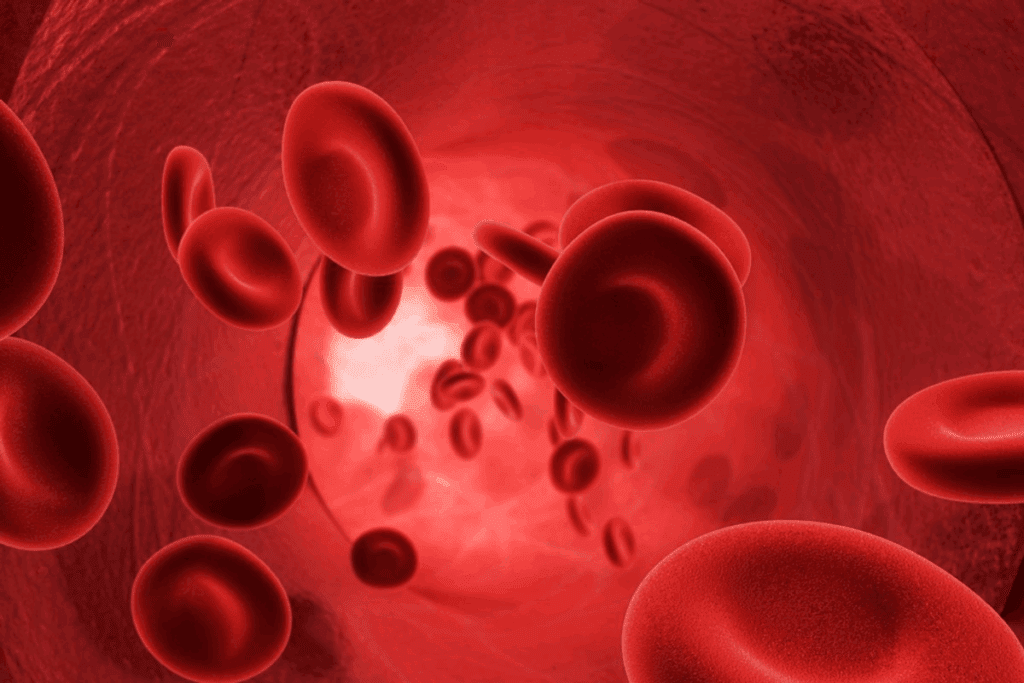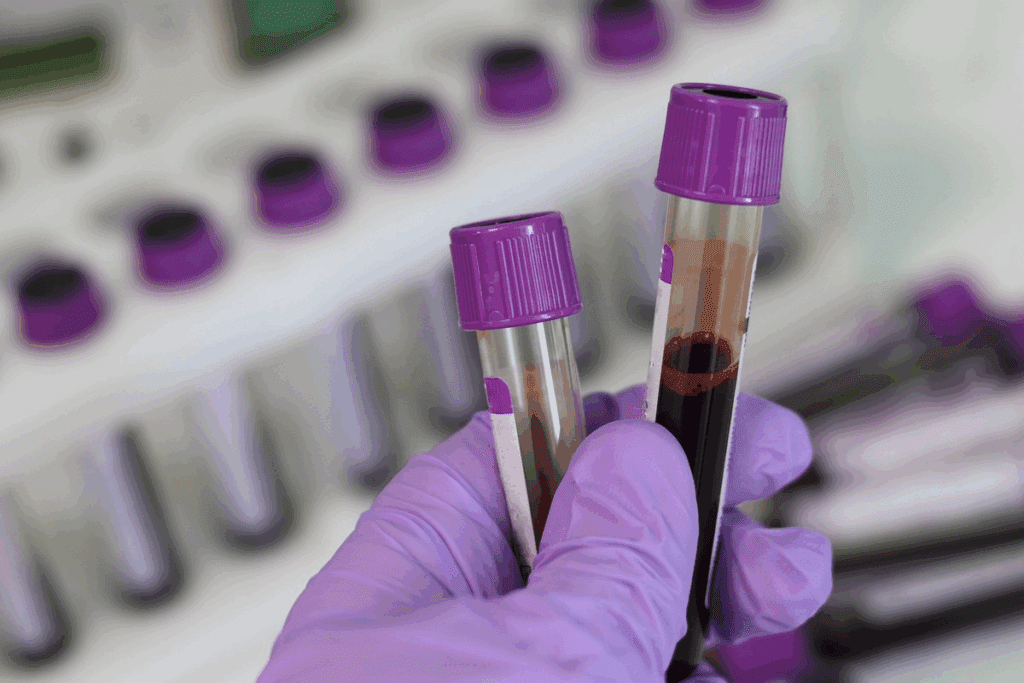
Many people face stress-induced erythrocytosis, a condition with too many red blood cells. Studies show that long-term stress can make the body produce more red blood cells. This is the body’s way of reacting to stress.Can stress cause high red blood cell count? Explore the amazing physiological link between chronic stress and blood cell levels.
It’s important to know how stress affects red blood cell count. A high count can lead to serious health problems. It can cause blood clots and heart issues.
Key Takeaways
- Chronic stress can contribute to an increase in red blood cell count.
- Erythrocytosis can lead to serious health complications if left untreated.
- Understanding the causes of high red blood cell count is essential for effective management.
- Stress management techniques may help mitigate the risk of developing erythrocytosis.
- Further research is needed to fully understand the relationship between stress and red blood cell count.
Understanding Red Blood Cells and Their Function

Red blood cells are key to keeping our bodies balanced. They carry oxygen and nutrients to all parts of our body.
What Are Red Blood Cells?
Red blood cells are disk-shaped and carry hemoglobin. This protein helps transport oxygen from the lungs to the rest of the body. They are made in the bone marrow through erythropoiesis.
Normal Red Blood Cell Count Ranges
The number of red blood cells varies by age, sex, and altitude. Adult men usually have 4.32-5.72 million cells per microliter. Women have about 3.90-5.03 million cells per microliter.
| Category | Normal Range (million cells/μL) |
| Adult Men | 4.32-5.72 |
| Adult Women | 3.90-5.03 |
The Role of Red Blood Cells in the Body
Red blood cells mainly carry oxygen to our body’s tissues. They also take away carbon dioxide, a waste product, back to the lungs. This is important for keeping our body’s acid-base balance and ensuring tissues get enough oxygen.
In short, red blood cells are essential for our circulatory system. They help deliver oxygen and remove carbon dioxide. Knowing how they work and their normal counts helps us understand their role in our health.
What Constitutes a High Red Blood Cell Count?

Knowing what a high red blood cell count means is key to spotting conditions like erythrocytosis and polycythemia. A high count means there are more red blood cells than usual. This can happen for many reasons, both good and bad.
Defining Erythrocytosis and Polycythemia
Erythrocytosis is when you have more red blood cells than normal. Polycythemia is when you have more of all blood cells, including red, white, and platelets. Polycythemia vera is a specific type of polycythemia that makes too many of these cells.
Doctors use blood tests to check for these conditions. They look at the red blood cell count, hematocrit, and hemoglobin levels. These values can change based on your age, sex, and other factors.
Clinical Significance of Elevated Red Blood Cells
Having too many red blood cells can be serious. It can make your blood thicker, which can lead to heart problems like strokes. The seriousness of this depends on why you have more red blood cells.
| Condition | Red Blood Cell Count | Hematocrit | Clinical Implication |
| Normal | 4.32-5.72 million cells/μL | 40-54% | – |
| Erythrocytosis | >5.72 million cells/μL | >54% | Increased risk of thrombosis |
| Polycythemia Vera | Elevated | Elevated | Myeloproliferative neoplasm |
Common Symptoms of High Red Blood Cell Count
People with high red blood cell counts might feel headaches, dizziness, and itching, often after taking a hot shower. The thick blood can also reduce blood flow to organs. This can cause fatigue, shortness of breath, and vision problems.
In summary, a high red blood cell count needs careful attention to avoid serious issues. It’s important for doctors and patients to understand erythrocytosis and polycythemia.
Common Causes of Elevated Red Blood Cell Count
There are many reasons why red blood cell count can go up. These include medical issues, environmental factors, and lifestyle choices. Knowing these causes helps doctors diagnose and treat the problem.
Medical Conditions Associated with High RBC
Some medical conditions can make red blood cell count go up. Polycythemia vera is a rare blood cancer that causes too many red blood cells. Other issues like kidney disease and congenital heart disease, also lead to more red blood cells being made.
Conditions like obstructive sleep apnea and chronic obstructive pulmonary disease (COPD) cause low oxygen levels. This leads to more red blood cells being made to carry oxygen.
Environmental Factors
Environmental factors also affect red blood cell count. High altitude makes the body produce more red blood cells to handle lower oxygen levels. Being exposed to carbon monoxide also affects red blood cell count by reducing oxygen delivery.
“At high altitudes, the body adapts to lower oxygen levels by increasing red blood cell production, a process mediated by erythropoietin.”
Lifestyle Contributors
Lifestyle choices can also raise red blood cell count. Smoking is a big risk factor because it reduces oxygen delivery and increases erythropoietin production. Dehydration can also make red blood cell count seem higher because of less plasma.
Using certain substances, like erythropoietin-stimulating agents and anabolic steroids, can also increase red blood cell production. This leads to higher counts.
The Physiology of Stress Response
Stress sets off a series of body reactions. These reactions help the body face or run away from threats. This complex process involves many body systems.
Acute vs. Chronic Stress
There are two main types of stress: acute and chronic. Acute stress is a quick response to immediate dangers. It’s like the “fight or flight” response. This stress usually ends once the danger is gone.
Chronic stress lasts longer. It comes from ongoing problems like work stress, money issues, or relationship troubles. Chronic stress can deeply affect the body, causing health problems.
The HPA Axis and Stress Hormones
The Hypothalamic-Pituitary-Adrenal (HPA) axis is key in the body’s stress response. When stress is sensed, the hypothalamus releases CRH. This hormone makes the pituitary gland release ACTH. ACTH then tells the adrenal glands to make cortisol, a major stress hormone.
Cortisol helps the body deal with stress by raising blood sugar, weakening the immune system, and helping break down fat, protein, and carbs. But, too much cortisol can harm, like causing weight gain, high blood pressure, and insulin resistance.
How Stress Affects Different Body Systems
Stress impacts various body systems, including the heart, immune, and nervous systems. For example, chronic stress can raise heart rate and blood pressure, which might lead to heart disease.
- The immune system weakens with chronic stress, making us more prone to sickness.
- The nervous system is also affected, leading to anxiety, depression, and other mental health issues.
- The digestive system can suffer too, with stress causing problems like IBS and acid reflux.
Knowing how stress works is key to managing it well and reducing its harm to health.
Can Stress Cause High Red Blood Cell Count?
Research shows a link between stress and higher red blood cell counts, known as erythrocytosis. This section explores how stress affects red blood cell production. It looks at the body’s response to stress and how it can lead to more red blood cells.
The Stress-Erythropoiesis Connection
Erythropoiesis, the making of red blood cells, is affected by stress and hormones. Stress releases hormones that can boost red blood cell production. This connection is complex, involving many body processes.
When we’re stressed, our body’s HPA axis is activated. This releases stress hormones like cortisol and adrenaline. These hormones get our body ready for action by increasing heart rate and energy. Long-term stress can harm our body, including our blood system.
Research Evidence on Stress and RBC Elevation
Studies have looked at stress and red blood cell counts. They found that chronic stress can lead to more red blood cells. For example, one study on chronic stress showed a link to increased red blood cell production.
Research on athletes and people living at high altitudes also shows how stress affects our bodies. At high altitudes, our body makes more red blood cells to handle lower oxygen. Intense exercise also triggers this response, leading to more red blood cells.
Mechanisms Behind Stress-Induced Erythrocytosis
The reasons for stress-induced erythrocytosis are complex. Stress hormones are key in controlling red blood cell production. For instance, cortisol affects EPO production, which is vital for making red blood cells.
The sympathetic nervous system, active during stress, also plays a role. This system can make more red blood cells available in our blood. Knowing how stress affects red blood cell production is important.
Stress-Induced Erythrocytosis: Mechanisms and Pathways
Stress can make our bodies produce more red blood cells, a condition called stress-induced erythrocytosis. This process is complex and involves many physiological pathways.
The Role of Stress Hormones in Red Blood Cell Production
Stress hormones like cortisol and adrenaline are key to how our body responds to stress. They help increase red blood cell production by releasing erythropoietin. This hormone is made by the kidneys and helps make red blood cells.
Erythropoietin is a major player in making red blood cells. When stress hormones trigger their release, it can cause an increase in red blood cell count. This is how our body adapts to stress, getting ready for injury or needing more oxygen.
Sympathetic Nervous System Activation
The sympathetic nervous system kicks in during stress, releasing neurotransmitters like norepinephrine. This activation affects many processes, including the heart and red blood cell production. It helps release more erythropoietin and boosts red blood cell production.
Inflammatory Responses and Erythropoiesis
Long-term stress can cause ongoing inflammation in the body. Inflammatory cytokines can mess with erythropoiesis, affecting erythropoietin production. While short-term inflammation can help, long-term inflammation can disrupt red blood cell production, leading to anemia or erythrocytosis.
The relationship between stress, inflammation, and erythropoiesis shows how complex stress-induced erythrocytosis is. Understanding these connections is key to diagnosing and treating conditions with high red blood cell counts.
Psychological Stress and Hematological Changes
Psychological stress can change how our blood cells are made. This is important for understanding how stress affects our health. The system that makes blood cells is very sensitive to stress.
Emotional Stress Impact on Bone Marrow Function
Emotional stress can change how our bone marrow works. The bone marrow makes red and white blood cells and platelets. Studies show stress can affect this process in complex ways.
Stress can change the bone marrow’s environment. This can affect how blood cells are made. For example, stress can make more cytokines, which help fight infections.
Anxiety and Blood Cell Production
Anxiety can change how blood cells are made. People with anxiety might have different blood cell counts. For example, anxiety can make more white blood cells, showing inflammation.
The body’s stress response, including hormones like cortisol, affects blood cell production. Chronic anxiety can lead to long-lasting changes in blood cells.
Chronic Stress Effects on Blood Composition
Chronic stress can deeply affect our blood. It can change how blood cells are made over time. This can lead to more red blood cells, among other changes.
The ways stress hormones and the nervous system affect blood cell production are complex. Understanding these is key to seeing how chronic stress impacts health.
Studying stress’s effects on blood cells helps us understand stress’s broader health impacts. This knowledge can help us find ways to manage stress and protect our blood system.
Potential Complications of Untreated High Red Blood Cell Count
An untreated high red blood cell count can lead to serious health issues. It can cause problems in different parts of the body. This can affect how well the body works.
Cardiovascular Risks
High red blood cell count can harm the heart and blood vessels. It makes blood thicker, which raises the chance of blood clots. These clots can block blood flow and cause heart attacks or strokes.
People with high red blood cell count are more likely to get heart disease. The thick blood puts extra stress on the heart. This can lead to high blood pressure and heart failure.
Neurological Complications
High red blood cell count can also harm the brain. The thick blood can make it hard for blood to reach the brain. This can cause dizziness, headaches, and even strokes.
It can also make it hard to think clearly and remember things. In bad cases, it can cause serious brain problems.
Long-term Health Consequences
Ignoring a high red blood cell count can lead to long-term health problems. It can increase the risk of heart disease and brain issues. These problems can make life harder and shorten life expectancy.
It’s important for people with high red blood cell count to get medical help. Regular check-ups and treatment can prevent serious health issues.
Differentiating Between Stress-Related and Pathological Causes
Figuring out why someone has a high red blood cell count is tricky. It’s important to determine if it’s from stress or a serious health issue. Getting the right diagnosis is key to treating it properly.
Temporary vs. Persistent Elevations
It’s important to know how long the red blood cell count is high. If it’s just for a short time, it might be from stress. But if it keeps going up, it could mean a serious health problem.
Key factors to consider:
- Duration of elevated RBC count
- Presence of other symptoms
- Medical history
When to Consider Other Medical Conditions
If the red blood cell count stays high, look into other health issues. These could be problems with making blood or heart health issues.
| Condition | Effect on RBC Count | Diagnostic Indicators |
| Polycythemia Vera | Increased RBC production | Presence of JAK2 mutation |
| Chronic Hypoxia | Compensatory increase in RBC | Low oxygen saturation levels |
| Kidney Disease | Altered erythropoietin production | Abnormal kidney function tests |
Diagnostic Approaches for High RBC Count
To find out why someone has a high red blood cell count, doctors use several methods. They look at the patient’s health, do blood tests, and might use imaging. This helps find the real cause.
Diagnostic steps may include:
- Complete Blood Count (CBC) to assess RBC count and other blood parameters
- Erythropoietin level measurement
- Genetic testing for mutations associated with myeloproliferative disorders
- Imaging studies to assess for hypoxia or other underlying conditions
The Relationship Between Emotional Well-being and Blood Parameters
The connection between emotional well-being and blood health is complex. Mental health can affect blood cell production and composition. Research shows that emotional well-being influences various physiological processes.
Impact of Mental Health on Hematological Status
Mental health is key to hematological status. Studies show that stress, anxiety, or depression can change blood parameters. This includes red and white blood cell counts and platelet counts.
Key factors influenced by mental health include:
- Stress Hormones: Stress hormones like cortisol can alter blood cell production and regulation.
- Inflammatory Responses: Chronic stress can cause long-term inflammation, affecting blood cell production and overall health.
- Immune System Modulation: Mental health can change the immune system. This affects the body’s ability to fight infections and maintain healthy blood cell counts.
Stress-Related Changes in Multiple Blood Components
Stress can change various blood components. It affects not just red blood cells but also other critical elements. For example, stress can increase white blood cells, showing an underlying inflammatory condition.
The Mind-Body Connection in Hematology
The mind-body connection is vital in hematology. Emotional well-being affects blood health through physiological processes. Understanding this connection is key to holistic blood disorder management.
Key aspects of the mind-body connection include:
- The role of stress hormones in modulating blood cell production.
- The impact of mental health on the immune system and its effect on blood parameters.
- The possibility of psychological interventions improving hematological outcomes.
By studying emotional well-being and blood parameters, researchers and healthcare professionals can create better treatment plans. These plans address both physical and psychological health aspects.
Clinical Studies on Stress and Blood Cell Counts
Research has shown how stress impacts blood cell counts. It reveals the link between stress hormones and blood health. This section covers the effects of both short-term and long-term stress on blood cells.
Research Findings on Acute Stress
Acute stress can quickly change blood cell counts. A study in the Journal of Applied Physiology found red blood cells increase with stress hormones like adrenaline.
- Acute stress triggers the release of stress hormones.
- These hormones cause an increase in red blood cell count.
- The body’s ‘fight or flight’ response is activated, leading to changes in blood composition.
Studies on Chronic Psychological Stress
Chronic stress can lead to long-lasting changes in blood cell counts. A study in Psychosomatic Medicine found that white blood cell counts are higher in those under chronic stress. This shows a long-term inflammatory response.
Key findings include:
- Chronic stress leads to persistent elevation in white blood cell counts.
- There’s a link between chronic stress and changes in blood cell production.
- The impact of chronic stress on hematological parameters can have long-term health implications.
Limitations in Current Research
Current research offers insights into stress and blood cell counts. Yet, there are limitations. Many studies use animal models or have small samples. This calls for more human studies.
Future research should aim for long-term studies. These can better show how stress and blood changes interact. Understanding this is key to finding ways to protect blood health from stress.
Managing Stress to Normalize Red Blood Cell Levels
To reduce the impact on red blood cell production, it’s key to use effective stress management strategies. Chronic stress can cause many changes in the body, including higher red blood cell counts. By managing stress, people can keep their red blood cell levels in check and boost their health.
Effective Stress Reduction Techniques
There are several ways to lower stress and its effects on the body. These include:
- Meditation: Regular meditation can lower stress hormones like cortisol, helping to control red blood cell production.
- Deep Breathing Exercises: Deep breathing calms the nervous system, reducing stress.
- Physical Activity: Exercise reduces stress and anxiety by releasing endorphins, or “feel-good” hormones.
Lifestyle Modifications
Changing your lifestyle can also help manage stress and its effects on red blood cell levels. Consider these changes:
| Lifestyle Change | Benefit |
| Improving Sleep Quality | Boosts overall health and helps control stress hormones. |
| Healthy Diet | Gives essential nutrients for health and stress resistance. |
| Reducing Caffeine and Alcohol | Minimizes stress and anxiety by avoiding stimulants and depressants. |
Mind-Body Approaches for Stress Management
Mind-body approaches are great for managing stress. Techniques such as:
- Yoga: Combines physical movement with deep breathing and meditation to reduce stress.
- Mindfulness: Practices like mindfulness meditation help stay present and reduce worries.
- Cognitive Behavioral Therapy (CBT): A therapy that helps change negative thought patterns that cause stress.
By adding these stress management techniques to your daily routine, you can possibly normalize your red blood cell levels and enhance your overall well-being.
Conclusion
This article has looked into how stress affects red blood cell counts. It covered the science behind it and what it means for health.
Key points show that stress can raise red blood cell counts. This happens through stress hormones and the nervous system.
Knowing how stress and red blood cells are linked is key. It helps doctors diagnose and treat related health issues better.
This article shows that stress is a big factor in red blood cell counts. It also calls for more study on this connection.
FAQ
Can stress really cause an increase in red blood cell count?
Yes, stress can increase red blood cell count. Chronic stress releases hormones like cortisol and adrenaline. These hormones can affect how the body makes new blood cells.
What is considered a high red blood cell count?
A high red blood cell count is when it’s above normal. For adults, it’s over 5.5 million cells per microliter for men and over 5.0 million for women.
How does stress affect red blood cell production?
Stress can change how the body makes red blood cells. Stress hormones can make the body produce more red blood cells. This can happen if stress lasts a long time.
Are there other causes of high red blood cell count besides stress?
Yes, many things can cause a high red blood cell count. This includes diseases like polycythemia vera and heart disease. Environmental factors like high altitude and smoking also play a role.
What are the possible complications of an untreated high red blood cell count?
An untreated high red blood cell count can cause serious problems. It can increase the risk of heart attacks and strokes. It can also lead to neurological symptoms and other health issues.
How can stress be managed to normalize red blood cell levels?
Managing stress is key to normalizing red blood cell counts. Techniques like meditation and yoga can help. So can regular exercise, a balanced diet, and enough sleep.
Can anxiety affect red blood cell count?
Yes, anxiety can impact red blood cell count. It can affect how the body responds to stress and makes new blood cells. Chronic anxiety can lead to long-term changes in red blood cell production.
What is the relationship between emotional well-being and blood parameters?
Emotional well-being greatly affects blood parameters, including red blood cell count. Stress and mental health can change how the body makes blood cells. This shows how the mind and body are connected in blood cell production.
How can one differentiate between stress-related and pathological causes of high red blood cell count?
To tell the difference, a full medical check-up is needed. Tests and a detailed medical history help find the cause. This can be stress or a disease.
References
- Jern, S., Jern, C., & Wadenvik, H. (1991). ‘Polycythaemia of stress’ in subjects with Type A and Type B behaviour patterns. Journal of Psychosomatic Research, 35(1), 91-98. https://pubmed.ncbi.nlm.nih.gov/2023145/



































